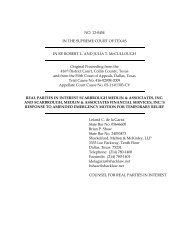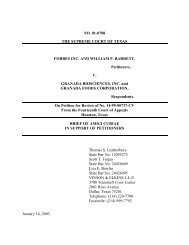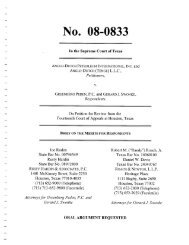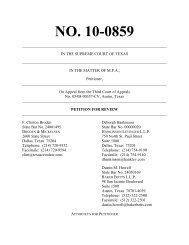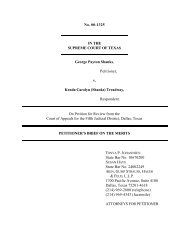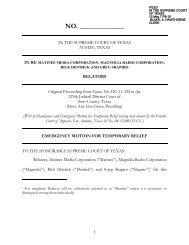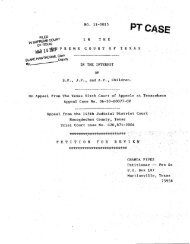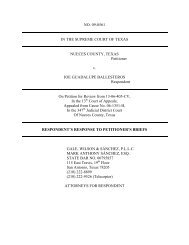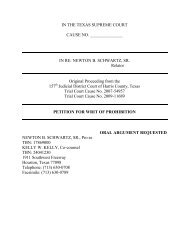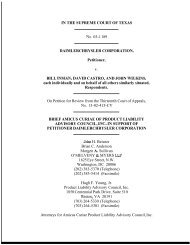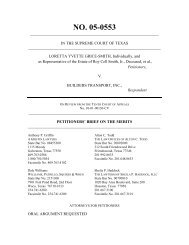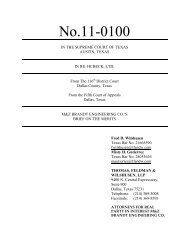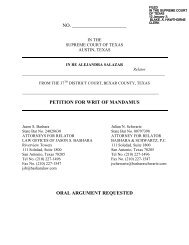Petition for Writ of Mandamus - Filed - Supreme Court of Texas
Petition for Writ of Mandamus - Filed - Supreme Court of Texas
Petition for Writ of Mandamus - Filed - Supreme Court of Texas
Create successful ePaper yourself
Turn your PDF publications into a flip-book with our unique Google optimized e-Paper software.
Item 11. Cost <strong>of</strong> goods sold (COGS)<br />
Note: A taxable entity may elect to use COGS to compute margin<br />
ONLY if the taxable entity sells real or tangible personal<br />
property in the ordinary course <strong>of</strong> business OR if the taxable<br />
entity qualifies to compute COGS under any one <strong>of</strong> the<br />
exceptions noted in <strong>Texas</strong> Tax Code Section 171.1012 or<br />
Rule 3.588. Enter an amount ONLY if the entity qualifies to<br />
use COGS to compute margin.<br />
"Goods" are defined as real or tangible personal property sold<br />
in the ordinary course <strong>of</strong> business. Tangible personal property<br />
includes computer programs as well as films, sound recordings,<br />
videotapes, live and prerecorded television and radio<br />
programs, books and other similar property. Tangible personal<br />
property does not include intangible property or services.<br />
Generally, a taxable entity in the service industry will not<br />
have COGS as they do not sell tangible personal property<br />
or real property in the ordinary course <strong>of</strong> business. However,<br />
if a transaction contains elements <strong>of</strong> both a sale <strong>of</strong> tangible<br />
personal property and a service, a taxable entity may only<br />
subtract as COGS the cost otherwise allowed by this section<br />
in relation to the tangible personal property sold. The<br />
taxable entity may not subtract as COGS the labor costs<br />
related to the services per<strong>for</strong>med.<br />
A taxable entity may make a subtraction under this section<br />
in relation to the COGS only if that entity owns the goods. A<br />
taxable entity that is a member <strong>of</strong> a combined group may<br />
subtract allowable costs as COGS if the goods <strong>for</strong> which<br />
the costs are incurred are owned by another member <strong>of</strong><br />
the combined group. A payment made to an affiliated entity<br />
who is not a member <strong>of</strong> the combined group may only be<br />
included in COGS if the transaction is made at arm's length.<br />
A taxable entity that is subject to Internal Revenue Code,<br />
263A, 460 or 471 may choose to expense or capitalize<br />
allowable costs associated with the goods purchased or<br />
produced. All other taxable entities will expense allowable<br />
costs associated with the goods purchased or produced.<br />
Expensing COGS — An entity that elects to expense<br />
allowable costs will have no beginning or ending inventory.<br />
The entity should include all allowable costs as described<br />
below <strong>for</strong> the accounting period on which the report is based.<br />
Capitalized COGS — If the entity elects to capitalize COGS,<br />
the calculation will include those allowable costs that were in<br />
inventory at the beginning <strong>of</strong> the period upon which the tax is<br />
based plus allowable costs capitalized during the period minus<br />
allowable costs in ending inventory at the end <strong>of</strong> the period.<br />
The election to expense or capitalize allowable costs is<br />
made by filing the franchise tax report using one method or<br />
the other. The election is <strong>for</strong> the entire period on which the<br />
report is based and may not be changed after the due date<br />
or the date the report is filed, whichever is later.<br />
Note: Generally COGS <strong>for</strong> <strong>Texas</strong> franchise tax reporting purposes<br />
will not equal the amount used <strong>for</strong> federal income tax<br />
reporting purposes or <strong>for</strong> financial accounting purposes.<br />
Typically, this amount cannot be found on a federal income<br />
tax report or on an income statement. It is a calculated<br />
amount specific to <strong>Texas</strong> franchise tax.<br />
Cost <strong>of</strong> goods sold includes all direct costs <strong>of</strong> acquiring or<br />
producing the goods, including:<br />
• labor costs including W-2 wages, IRS Form 1099 wages,<br />
temporary labor, payroll taxes and benefits;<br />
• cost <strong>of</strong> materials that are an integral part <strong>of</strong> specific<br />
property produced;<br />
• cost <strong>of</strong> materials that are consumed in the course <strong>of</strong><br />
per<strong>for</strong>ming production activities;<br />
• handling costs, including costs attributable to processing,<br />
assembling, repackaging and inbound transportation;<br />
• storage costs (except <strong>for</strong> the rental <strong>of</strong> a storage facility),<br />
including the costs <strong>of</strong> carrying, storing or warehousing<br />
property;<br />
• depreciation, depletion and amortization reported on the<br />
federal income tax return on which the report under this<br />
chapter is based, to the extent associated with and<br />
necessary <strong>for</strong> the production <strong>of</strong> goods, including recovery<br />
described by, Sec. 197, Internal Revenue Code, and<br />
property described in Sec. 179, Internal Revenue Code;<br />
• the cost <strong>of</strong> renting or leasing equipment, facilities or real<br />
property used <strong>for</strong> the production <strong>of</strong> the goods, including<br />
pollution control equipment and intangible drilling and dry<br />
hole costs (does NOT include impairment costs/expenses);<br />
• the cost <strong>of</strong> repairing and maintaining equipment, facilities<br />
or real property directly used <strong>for</strong> the production <strong>of</strong> the<br />
goods, including pollution control devices;<br />
• costs attributable to research, experimental, engineering and<br />
design activities directly related to the production <strong>of</strong> the<br />
goods, including all research or experimental expenditures<br />
described by Sec. 174, Internal Revenue Code;<br />
• geological and geophysical costs incurred to identify and<br />
locate property that has the potential to produce minerals;<br />
• taxes paid in relation to acquiring or producing any<br />
material, or taxes paid in relation to services that are a<br />
direct cost <strong>of</strong> production;<br />
• the cost <strong>of</strong> producing or acquiring electricity sold; and<br />
• a contribution to a partnership in which the taxable entity<br />
owns an interest that is used to fund activities, the costs <strong>of</strong><br />
which would otherwise be treated as COGS <strong>of</strong> the<br />
partnership, but only to the extent that those costs are<br />
related to goods distributed to the contributing taxable entity<br />
as goods-in-kind in the ordinary course <strong>of</strong> production<br />
activities rather than being sold by the partnership.<br />
In addition to the items listed above, COGS includes the<br />
following costs in relation to the taxable entity's goods:<br />
• deterioration <strong>of</strong> the goods;<br />
• obsolescence <strong>of</strong> the goods;<br />
• spoilage and abandonment, including the costs <strong>of</strong> rework,<br />
reclamation and scrap (does NOT include impairment<br />
costs/expenses);<br />
• if the property is held <strong>for</strong> future production, preproduction<br />
direct costs allocable to the property, including storage<br />
and handling costs, unless specifically excluded below;<br />
• postproduction direct costs allocable to the property,<br />
including storage and handling costs, unless specifically<br />
excluded below;<br />
• the cost <strong>of</strong> insurance on a plant or a facility, machinery,<br />
equipment or materials directly used in the production <strong>of</strong><br />
the goods;<br />
• the cost <strong>of</strong> insurance on the produced goods;<br />
15



